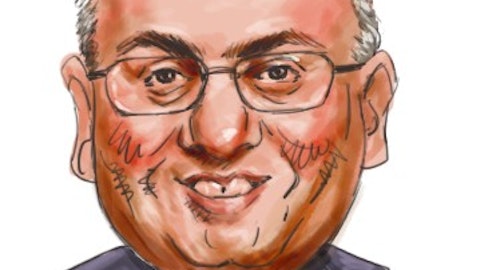Hewlett-Packard Company (NYSE:HPQ)’s COO, Bill Veghte, transferred 58,500 of his directly held shares of the company’s stock to an annuity trust which then purchased about 23,000 additional shares, according to a filing with the SEC. About 15,000 shares are still held directly, so in terms of total ownership the trust’s buy represented a large percentage increase in Veghte’s holdings. It’s a good idea to track insider trading activity because studies show that on average stocks bought by insiders outperform the market (see more about studies on insider trading) . We think that this is because the incentives for an insider to diversify their investments are so strong that an insider will only buy more shares when they are very confident in the company’s prospects. Hewlett-Packard’s stock price is down 49% year to date, and 68% from two years ago. It’s possible that Veghte believes that the company is (finally) poised for a turnaround, though we’d note that there was significant buying from other insiders as recently as this past June. Find more insider purchases at Hewlett-Packard.
Hewlett-Packard Company’s fiscal year ended in October 2012. The company recently reported its results, which showed revenue down 5% from the previous fiscal year. Operating costs were up, but this was entirely due to large charges related to goodwill impairments and restructuring. If we ignore goodwill impairments, restructuring, and acquisition related charges, operating income dropped 18%; in addition, the size of the charges likely reflects poorly on HP’s management or at least its past management and culture. Sales actually declined at a faster rate in the fourth fiscal quarter than for the year as a whole, also not a good sign.
If there’s a case to be made for HP, it’s that the market has exaggerated how poorly the company is performing. Wall Street analysts expect HP to earn $3.32 in the current fiscal year, which implies a P/E multiple of only 4. This gives the business plenty of room to underperform and still qualify as a value investment. The dividend yield is also close to 4%, though the stock probably isn’t safe enough to be considered on pure income terms.
The Baupost Group, which is managed by Seth Klarman, reported owning over 14 million shares of Hewlett-Packard Company in its 13F filing for the third quarter of 2012; however, this was a 46% decrease from three months earlier (check out Seth Klarman’s stock picks). Kerr Nielson and Steve Cohen were two billionaires whose funds sold out of HP completely during the third quarter of the year.
HP’s challenge has been to try to shift its business away from hardware- particularly as demand for personal computers has fallen- into software and services. So far it hasn’t been successful, and neither has Dell Inc. (NASDAQ:DELL), which billionaire David Einhorn recently abandoned after deciding that the company would not be able to make this transition (see what Einhorn has been buying instead). Dell’s earnings were down 47% in its most recent quarter versus a year earlier, and it trades at 6 times forward earnings estimates as the market is a bit more optimistic about that company than HP. If an investor wants to get into this industry, Dell might be a good alternative to HP. However, we think that we’d rather pay a premium for International Business Machines Corp. (NYSE:IBM), which has managed to hold its net income about steady as that company has a more substantial software and services business. IBM’s forward P/E is 11, but we’d consider it a safer investment and that valuation is still low enough that it would probably prove a good value.
Of course, the shift away from personal computing also poses threats to companies such as Microsoft Corporation (NASDAQ:MSFT) and Intel Corporation (NASDAQ:INTC), and has driven chipmaker Advanced Micro Devices, Inc. (NYSE:AMD) down about 60% in the last year. Microsoft and Intel were on our list of the ten tech stocks hedge funds are crazy about for the third quarter of 2012. Intel might be worth considering, while in Microsoft’s case it’s probably best to wait until there is more information about how the company’s new products are selling.
The insider purchase at HP is notable, but we still think that the company and Dell are too risky until they show signs of halting their decline. IBM, at least, seems to have done a better job anticipating and weathering industry trends and looks to us like a better buy.






